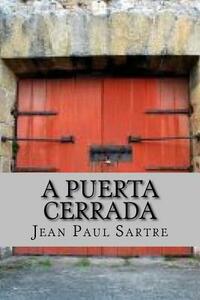You need to sign in or sign up before continuing.
Take a photo of a barcode or cover
challenging
funny
medium-paced
Plot or Character Driven:
Character
Diverse cast of characters:
Complicated
Read my review for this short story here:
https://bnagasravika.blogspot.com/2020/05/no-exit-by-jean-paul-sartre-story-review.html
https://bnagasravika.blogspot.com/2020/05/no-exit-by-jean-paul-sartre-story-review.html
dark
emotional
tense
medium-paced
Plot or Character Driven:
Character
Strong character development:
Yes
Loveable characters:
No
Diverse cast of characters:
Yes
Flaws of characters a main focus:
Yes
reflective
tense
fast-paced
Plot or Character Driven:
Character
Flaws of characters a main focus:
Yes
dark
emotional
fast-paced
Plot or Character Driven:
Character
Strong character development:
No
Loveable characters:
No
Diverse cast of characters:
No
Flaws of characters a main focus:
Yes
L’enfer c’est les autres
"If this is Hell, where are the Hell hounds gnawing at my entrails?"
-Approximation of Paul Simon's quote from Saturday Night Live sketch, 1985-1986 season
I picked this play for my classics book club around 2 months ago. Who knew that a play about existential terror would be so apropos right now?
Jean-Paul Sartre didn't just write long philosophical tracts that every intellectual hipster pretends to read, but you know they didn't. He also wrote six plays, his most famous being this one. It's only around 40 pages, so you should read it just so you can say you have read Sartre.
Three characters (one man and two women) are led one by one into a room. The door is locked. There is a bell you can ring for service, but it often doesn't work. There is a valet who shows up if it suits him. There are no windows, no books, no Amazon Prime. They are all in Hell, but why are they there? Why is the room furnished the way it is? Why are they there together? And where, to quote Paul Simon, are the Hell hounds gnawing at their entrails? Hell is clever that way. Nothing is by chance.
This play contains the famous, oft-quoted yet misunderstood line "Hell is other people." Sartre may well have hated other people, but what he meant here was how horrible the unrelenting gaze of others is. How being forced to see yourself, more specifically your wrongdoings, through others eyes for all eternity is the worst punishment (that and being stuck in a room with Second Empire furniture, evidently.)
I liked this, I didn't love it. I probably would have enjoyed it better reading it in the context of the time, but I've seen this referenced and parodied so many times (including the above-referenced SNL skit where Paul Simon's personal Hell is being trapped on an elevator playing Muzak versions of Simon & Garfunkel hits for all eternity) that I can't separate the original from the many things I've already seen that reference it.
No Exit is an interesting and disturbing existentialist play by French playwright Jean-Paul Sartre. I just finished it for my French IV Honors class, and am thoroughly enjoying studying the work.
dark
reflective
medium-paced
Plot or Character Driven:
Character
Strong character development:
Yes
Loveable characters:
No
Diverse cast of characters:
Complicated
Flaws of characters a main focus:
Yes
Confession time--I haven't read much of Satre's philosophical work; though I would guess that's many people. However, after reading No Exit, I am much more intrigued. No Exit is a one-act play in which three people find themselves in a room without (wait for it...) an exit. They have been placed in here as their essential version of hell to wait out eternity. The surprise is the method in which hell is enacted. It's not filled with traditional sadists who want to throw these characters on the rack and watch them writhe in pain, but rather a balance of or rather an imbalance of the three characters is what makes it the quintessential hell. Each character seeds the anger and frustration as they each reveal their secrets and then their true selves, illustrating why they make the perfect threesome for eternal damnation. I found Satre dialogue engaging and that the characters were easy to formulate through their lines. It's a quick but fascinating read.




